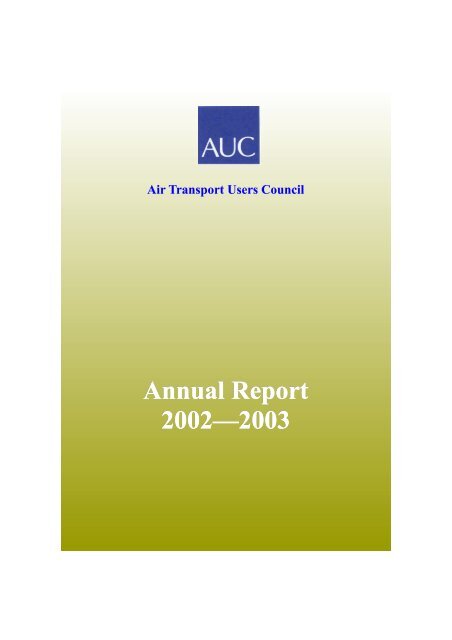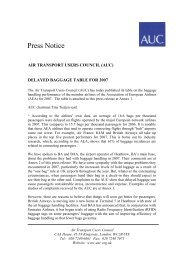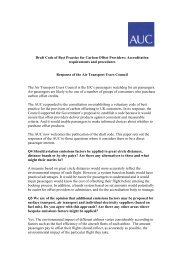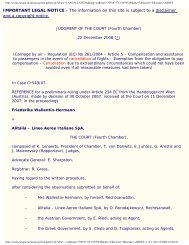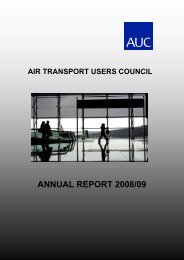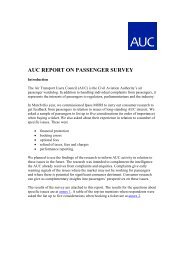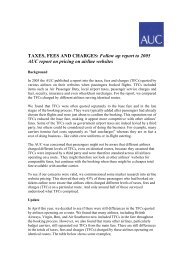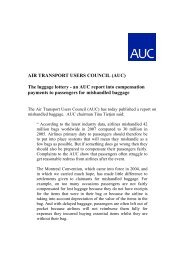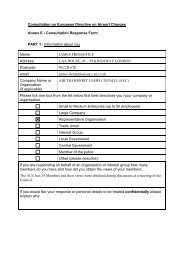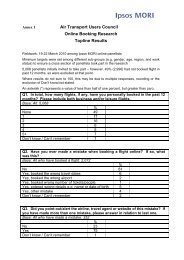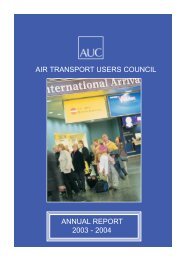Annual Report 2002—2003 - Air Transport Users Council
Annual Report 2002—2003 - Air Transport Users Council
Annual Report 2002—2003 - Air Transport Users Council
- No tags were found...
You also want an ePaper? Increase the reach of your titles
YUMPU automatically turns print PDFs into web optimized ePapers that Google loves.
not having travelled on the same flight as the passenger.Many of these complaints involved a journey with connecting flights, typically from a UKregional airport via an airport in mainlandEurope. This gives further weight to ouradvice that, whilst these flights are oftencheaper or more convenient (or both) thanalternative direct services from, for example,Heathrow, Gatwick or Manchester, theycome with a baggage "health warning".Regrettably, this has been a consistenttheme in our reports in recent years. It isone of the reasons why we continue to callfor publication of a number of performanceindicators for airlines, including statistics onmishandled baggage (see Community <strong>Air</strong>Passenger <strong>Report</strong>ing System, page 13).We are also hoping that the MontrealConvention, which is expected to come intoforce some time in 2003, with its increasedlimits on airlines' liability for passengers'luggage might help to concentrate airline minds on this problem. For the moment,however, we need to remain vigilant in the face of parsimonious and often arbitrarysettlements offered by airlines even within the protection currently afforded to them bythe liability limits in the Warsaw Convention.Another area of complaint that is causing us increasing concern is discrepanciesbetween flights that passengers believe they have booked over the internet and theflight details actually shown on their confirmation e-mails. Many airline websites giverepeated warnings to users to check the details. Unless an airline receives a numberof similar representations relating to reservations made around the same time, it will noteasily be persuaded that the discrepancy wasa result of computer, rather thanpassenger, error.A breakdown of written complaints by type ofcomplaint is given at table 1 on page 7.Last year, for the first time, we named the toptwenty airlines according to the number ofwritten complaints. We do so again this year,but repeat the warning that these are simpletotals without any weighting to reflect thenumber of passengers carried by theWhen Mrs X and her young niece andnephew were bumped off an overbookedflight, she was told that children under twodid not qualify for compensation at all, andchildren over two got half the adult rate. Wetold the airline that the EU rules on deniedboarding compensation made no reference atall to the age of passengers, though they dostate that compensation need not exceed theprice of the ticket. The airline paid up andassured us that it had amended its internalguidance accordingly.Mr Y was delayed overnight for seventeenhours after his flight was diverted but hereceived no compensation from the airlinewhen he complained. We managed toconvince the airline to reimburse his £144expenses. We were not sure what to makeof the airline’s letter where it said: “it isnot very easy to foresee a plane running outof fuel”.individual airlines. Unfortunately, statistical data that would enable us to make validcomparisons between airlines on a per-million-passengers basis is not available froman independent source. The full top twenty list is at table 2 on page 8.7
Table 2Top Twenty <strong>Air</strong>lines by number of complaints to the AUC1 April 2002 — 31 March 2003Position <strong>Air</strong>line Total Total last year1 British <strong>Air</strong>ways Plc + subsidiaries 257 1172 Ryanair 201 773 KLM + subsidiaries 140 534 <strong>Air</strong> France 139 1105¹ Easyjet 106 746 MyTravel 41 397 Iberia 39 188 Britannia <strong>Air</strong>ways 35 339 BMI British Midlands 33 2910 Virgin Atlantic <strong>Air</strong>ways 30 2211 Thomas Cook <strong>Air</strong>lines 27 2412 Lufthansa 27 2313 Alitalia 26 1014 Emirates 26 1715 BMI Baby 25 1616 British European 24 1217 <strong>Air</strong> 2000 24 3218 <strong>Air</strong> India 21 1919 Aer Lingus 20 920 Pakistan International <strong>Air</strong>lines 19 13¹EasyJet totals include those recorded separately against Go before the merger of the two airlines9
Telephone Complaints and EnquiriesThe total number of telephone complaints andenquiries has levelled off this year compared with last,but we cannot be sure whether this is simply becausewe have approached the maximum number of callsthat we are able to handle. We may get a betterpicture of demand for our services during the comingyear because we have increased staff resources forcomplaints handling, and now have the capacity tohandle more calls.During the year, the main trends in our telephonecomplaints and enquiries closely mirrored those in thewritten complaints. There were fewer calls aboutdelay than in the previous period, but increaes in thenumbers of calls about mishandled baggage,reservation problems and flight cancellationsThe breakdown of categories of telephone complaintsand enquiries is at table 3 (overleaf).When Mr Z’s bag went missing,the airline said that it only had topay compensation according to hisfree weight allowance. Mr Z’sbag had weighed rather morethan his free allowance. Wereminded the airline that theWarsaw Convention merely put alimit per kilo of luggage, it madeno reference to free baggageallowancs: in agreeing to carrythe overweight bag they hadaccepted liability for it in itsentirety. The airline paid up,basing its payment on the actualweight of the bag.10
Table 3Telephone Complaints by Type1 April 2002—31 March 2003Number%of TotalMishandled baggage 775 (648) 22 (9)Ticketing 452 (513) 13 (15)Cancellation of flight 396 (249) 11 (7)Delay 296 (324) 8 (9)Reservations 255 (168) 7 (5)Other 220 (146) 6 (4)Schedules 213 (202) 6 (6)Overbooking 177 (136) 5 (4)Special needs 100 (89) 3 (3)<strong>Air</strong>line failure 93 (249) 3 (7)Documents ( visa, passport, etc…) 89 (65) 2 (2)In-flight Service 82 (98) 2 (3)Seating 79 (64) 2 (2)Tax 73 (65) 2 (2)Ground Services 62 (51) 2 (1)General information about the <strong>Air</strong>lines 57 (126) 2 (4)Safety 54 (57) 2 (2)Excess Baggage 51 (28) 1 (
Representing Passengers<strong>Air</strong> Passenger Rights In EuropeOver many years, our <strong>Annual</strong> <strong>Report</strong>s have included repeated reference to our effortsto promote air passenger rights on a Europe-wide basis, both independently andthrough our EU umbrella organisation, the Federation of <strong>Air</strong> <strong>Transport</strong> UserRepresentatives in Europe (FATURE). These efforts received potentially a major boostwhen, in March 2000, the European Commission published a consultation paper on airpassenger rights in the EU.In June the same year, having analysed responses to its consultation paper, theCommission published a Communication setting out a number of areas where it wouldpropose legislation or promote the development of voluntary initiatives by the airtransport industry. We have seen progress on most of these areas during the periodcovered by this report. But, at the time of writing, we are not yet ready to conclude thatthis work on air passenger rights is complete.Denied Boarding, Cancellation and DelayEach year, far too many air travellers suffer the consequences of overbooking,cancellations or delays. There is an existing EC Regulation on Denied BoardingCompensation (DBC) for passengers "bumped" off an overbooked flight departing froman EU airport. But it dates from 1992 and some of its provisions need updating. Thereis still no legislation setting out easily enforceable passenger rights in the event ofcancellation or delay.A 1998 proposal for amending the DBC Regulation did not come to fruition. Andthough we have had some success in having the issues of cancellation and delayaddressed through means other than legislation, these improvements still do not go farenough. We were therefore delighted when, in December 2001, the Commissionpublished a comprehensive proposal for a Regulation on compensation and assistanceto air passengers in the event of denied boarding, cancellation and delay.In February 2002, the UK Government invited comments on the Commission'sproposal. We made a detailed submission to the Government in May. Our submissionwelcomed intentions to increase the compensation for denied boarding from the 1992levels and to establish rules for compensation and assistance for cancellation anddelay.We also strongly endorsed proposals for enforcement of the new Regulation: theabsence of enforcement provisions in the current DBC Regulation has in the pastfrustrated our efforts to step in when individual airlines have appeared to us to besystematically flouting its provisions.12
The proposal for legislation is highly contentious both in terms of principle and detail.<strong>Air</strong>lines have argued strongly that the potential costs of the provisions would have to bepassed on to passengers in one way or another, and would far outweigh any consumerbenefits.We have always accepted that we need to take account of the potential cost topassengers of any demands that we make on the industry. But airlines have hadthings their own way for too long, and this proposed Regulation represents a majoropportunity to redress the balance. The proposal was proceeding through the EUlegislative process at the time of writing. We hope to be able to report a positiveoutcome on this proposed Regulation in next year's <strong>Annual</strong> <strong>Report</strong>.<strong>Air</strong>lines' Contracts with PassengersAs far back as our 1996-1997 report, we were welcoming the fact that the EuropeanCommission had issued a tender for a study into airline conditions of carriage (that is,the terms of the contract that passengers enter into when they buy a ticket). We hadrepeatedly pressed the Commission to conduct such an investigation, and weretherefore gratified when the report of the study (published in July 1997) concluded thata number of the terms of these contracts were unfair to passengers.Having received the report and recommendations of the study, however, theCommission decided to stay its hand whilst an International <strong>Air</strong> <strong>Transport</strong> Association(IATA) task force reviewed IATA's own Recommended Practice on General Conditionsof Carriage (RP1724) in the light of the report. The AUC accepted invitations to meetwith members of the IATA task force but, despite our best efforts, the changes toRP1724 that were subsequently adopted by IATA did not meet all of our concerns.The Commission nevertheless remained unwilling to consider bringing forward anyproposals for legislation at least until all other avenues for bringing about improvementshad been explored. In particular, it looked to Member States to apply the EC Directiveon Unfair Terms in Consumer Contracts to airlines' contracts with passengers.Therefore, in January 1999, we made a formal complaint to the Office of Fair Trading(OFT) about RP1724. The ensuing discussions between the OFT and IATA resulted ina new version, which was formally adopted by IATA in June 2000 but has still not comeinto effect.Meanwhile, the Commission published its consultation paper and subsequentCommunication on air passenger rights (to which we refer in the introduction to thissection on page 11). Then, in June 2002, it published a further consultation paper, thistime specifically on airlines' contracts with passengers. The paper drew heavily on theconclusions of the Commission's 1997 study and on the work of the AUC, the OFT andIATA.13
Computer Reservation SystemsIn 1989, the Community adopted a Regulation on a Code of Conduct for ComputerReservation Systems (CRSs). Much of the Code deals with the relationships betweenthe system providers, the airlines that sell their flights through CRSs, and travel agentsthat use them. It does, however, contain a number of important consumer protectionprovisions aimed at ensuring that passengers are in a position to make informedchoices from all of the options available to them.The Regulation includes a provision requiring periodic review of the Code, and it has sofar been amended twice – in 1993 and 1999. In 2002, the Commission beganconsultations on a further review, this time asking a fundamental question as towhether such a Code was still appropriate in the light of changes within the air transportindustry in recent years. Changes that the Commission had in mind included thedramatic growth of no-frills carriers, which do not use third party CRSs, and the trendtowards direct booking with airlines, particularly via airline websites.We recognise the changes that are taking place in the way we buy our airline tickets,and we believe that we should not seek retention of the Code without good reason. Forthe moment, however, we are not persuaded that the Code has entirely outlived itsusefulness to passengers. We have welcomed an undertaking that an impactassessment study to be conducted on behalf of the Commission will includeconsideration of the effects on passengers of options for the future of the Code.Other IssuesIn addition to our participation in the EU air passenger rights initiatives set out in theprevious section, we have contributed to a number of other consultations or inquiries onissues affecting air passengers. The direct impact on passengers of these issuesvaries, and the resources we devote to each submission varies accordingly. The mainones to which we contributed substantive submissions during the year are detailedbelow.Split ContractsThe CAA provides, through its <strong>Air</strong> Travel Organisers' Licensing (ATOL) scheme,financial protection for flights and holidays sold through tour operators. In August 2002,it published a consultation paper setting out proposals for closing a loophole in theATOL regulations under which travel agents could legally sell flights andaccommodation separately, effectively creating a package but one where there wasless than full protection.We thought the Authority had correctly identified two main consumer interests in thisconsultation - the scope of financial protection and passengers' awareness of theirprotection. We agreed that when an agent was putting together flights and15
accommodation – and possibly other elements such as car hire – for a passenger, thearrangements should be regarded as a package and enjoy the same protection as apackage purchased from a tour operator's brochure. Our submission thereforeendorsed the Authority's proposals for amending the ATOL Regulations.In our response, we concluded that such an amendment to the ATOL Regulationswould extend the scope of financial protection to more passengers. It would also bringthe ATOL Regulations into line with the Package Travel Regulations, which call for onesingle source of protection, something that would provide greater clarity.The consultation also asked for views on wider consumer protection issues, particularlyin the context of an ever-changing commercial environment and changing consumerpreferences. Because more and more passengers put together their own itineraries ina series of bookings with separate suppliers, the CAA questioned whether existinglegislation was best placed to continue to provide sufficient protection.The AUC has repeatedly called for a financial protection scheme for bookings withscheduled airlines. We acknowledged in our comments to the CAA that a schemecovering only scheduled flights could still leave gaps in financial protection for travellerswho made their holiday arrangements under separate bookings.Meanwhile, we considered it fundamentally important that consumers were fully awareof whether and for what part of their travel arrangements they were protected. Wherethey were not protected, information should be available as to how they might securesuch protection. The CAA and the AUC have both for some time sought to provide thisinformation and will continue to do so.Consultation on Responsibilities for Aviation HealthA House of Lords Select Committee report on <strong>Air</strong> Travel and Health in November 2000identified a number of areas where air travel might affect the health of air passengersand crew. The Government has since then established the Aviation Health WorkingGroup (of which the AUC is a member) to address the recommendations of the report.In seeking to ensure that action on the recommendations was taken forward theGovernment identified a need to establish where responsibility should lie for developingthe necessary expertise and for formulating technical advice and policyrecommendations. It therefore published a consultation paper seeking views on howbest to organise the work needed to support the Government’s policies on airpassenger and crew health, specifically as regards to which body should haveresponsibilities in this area.In our response, we supported the Department for <strong>Transport</strong>’s (DfT) proposal that theDfT and Department of Health should share a broad, strategic policy role on aviationhealth and that the CAA should take the lead in the provision of technical advice on thedevelopment of policies. We agreed that the CAA was best placed to offer suchtechnical advice, as it already possessed the necessary expertise on aircraft design16
and operation.We expressed concern, however, that the consultation paper only called for thespecialist unit merely to provide advice to industry, to consumer groups and to otherinterested parties as opposed to promulgating or publishing advice itself. Weacknowledged the resource implications of requiring the unit itself to promulgateinformation, and indeed that the AUC had a role to play in this area. But our concernwas that the responsibilities of the new unit should not be so precisely defined as topreclude any role at all in promoting aviation health advice directly to passengers.House Of Lords Inquiry into the Accountability Of RegulatorsThis House of Lords Inquiry included questions about the relationship betweenregulators and their associated consumer councils. We made a largely factualsubmission, concentrating on the relationship between the CAA and the AUC.However, we took the opportunity to draw attention to the fact that the CAA was underno statutory obligation to support the AUC and to state that we would prefer that it was.BMI British Midland/United <strong>Air</strong>lines Alliance Expansion AgreementIn last year's report, we referred to an application from the UK's BMI British Midlandand the US' United <strong>Air</strong>lines to the OFT for clearance to expand their existing allianceagreement. We had said in our submission to the OFT that the airlines' proposalsappeared to us to be a matter of the two airlines bringing together their networks in acomplementary way to the potential benefit of consumers. Principally, we thought thisalliance would provide stronger competition at Heathrow to British <strong>Air</strong>ways and itspartner airlines. At the time of writing of last year's report, the OFT had not reached itsverdict on the airlines' application.In August 2002, the OFT published, and invited comments on, its provisional findingthat the BMI/United application could provide benefits to consumers that wouldoutweigh possible anti-competitive effects, and that the two airlines should therefore bepermitted to proceed with their proposals. We made a brief further submissionendorsing the OFT's preliminary findings.The OFT subsequently announced its approval for the alliance expansion which, in anyevent, was always intended to come into force at such time as BMI achieved itslong-held aspiration to secure access to routes to the US out of Heathrow. At the timeof the application, it had appeared that BMI might be about to secure access toHeathrow (the AUC has consistently supported BMI's case for being granted thisaccess). In the event, however, the UK and US Governments have not been able toagree on terms under which this could be achieved.EU-US <strong>Air</strong> ServicesWe have referred in previous <strong>Annual</strong> <strong>Report</strong>s to the European Commission's desire to17
conduct discussions on services with the US on behalf of the Community. InNovember 2002, it secured judgements in the European Court of Justice (ECJ) againsteight Member States in respect of provisions in their bilateral air services agreements(ASAs) with the US which the Commission had argued were in breach of Communitylaw. The Commission followed up the judgements by calling on all Member States torenounce their ASA's with the US and to grant the Commission a mandate to negotiate"EU" ASA's with third countries.The House of Lords Select Committee on the European Union conducted an inquiryinto the implications of the ECJ rulings for aviation relations between the EU and theUS. In our evidence to the inquiry, we repeated views we had expressed in responseto a 1998 House of Lords Inquiry to the effect that we believed that Community-levelnegotiations would benefit consumers. Our main proviso in holding this view was thatthe overriding objective for EU negotiators should be a EU-US free-trade area in airtransport, directly comparable with the EU internal aviation market.The Future Development of <strong>Air</strong> <strong>Transport</strong> in the United KingdomIn July 2002, the Government published a series of consultation papers on options fordevelopment of airport capacity nationwide to meet demand for air travel for the nextthirty years. The consultations were part of a process of development of a GovernmentWhite Paper on the future of aviation in the UK.The consultation process was delayed by a court ruling that the Government had beenprocedurally wrong in excluding development options for London Gatwick <strong>Air</strong>port (it haddone so to honour an undertaken given by a previous Government not to sanctiondevelopment of a second runway there before 2019).At the time of writing, we had yet to finalise our submission to the Government, but wewould undoubtedly be calling for new runways in the South East as a matter of urgencyand for the White Paper to take account of the air transport needs of the UK regions.Moreover, we shall need to emphasise the need for interim measures to ensure thatexisting services are maintained pending completion of major new developments.Meanwhile, the House of Commons <strong>Transport</strong> Select Committee began an inquiry intoaviation, for which the hearings were continuing at the time of writing. The terms ofreference of the inquiry were wide ranging, covering infrastructural, political andeconomic issues. We made a written submission welcoming the inquiry and taking theopportunity to reiterate our existing views on the various issues it covered.18
External RelationsAs for any representative organisation, it is essential for us to maintain a constantdialogue with a wide range of contacts and partners. This helps us to take informedviews on matters affecting air passengers. We believe that, as a result, our opinionscarry weight with policy makers in industry and government.We enjoy long-established contacts with individual airlines, airports and tradeassociations, many of whom contact us proactively to let us know their concerns. Wehave also sought to continue, during the year, to develop and maintain close ties withUK and EU public sector officials and parliamentarians.During the year, the Chairman and Chief Executive accepted a number of speakinginvitations, and the secretariat has continued to meet requests for media briefing asoften as possible. Last year, we dealt with 432 media enquiries, including participationin 106 TV and radio interviews.We have also continued to provide information directly to passengers via the AUCwebsite and our Flight Plan and Travel Happy publications.Committees and Working GroupsA further important strand of our external relations activity is involvement, at varyinglevels of participation, with a number of standing and ad hoc committees and workinggroups. The main ones relevant to this report are listed below.<strong>Air</strong> <strong>Transport</strong> Action Group (ATAG)<strong>Air</strong> Travel Insolvency Protection Advisory Committee (ATIPAC)<strong>Air</strong>line–Consumer Forum<strong>Air</strong>port Consultative CommitteesAssociation of British Travel Agents (ABTA) Code of Conduct CommitteeAviation Health Working GroupCommunity <strong>Air</strong> Passenger <strong>Report</strong>ing System (CAPRS) Panel of ExpertsConsumer <strong>Council</strong>s ForumDisabled Persons <strong>Transport</strong> Advisory Committee (DPTAC)European Commission Industry and Social Group (<strong>Air</strong> <strong>Transport</strong>)ECAC Task Force on Economic Strategy (ECOSTRAT)Federation of <strong>Air</strong> <strong>Transport</strong> <strong>Users</strong> Representatives in Europe (FATURE)London's <strong>Air</strong>ports Access ForumNational Aviation Security Committee (associate member)National <strong>Air</strong> Traffic Services (NATS) Stakeholder <strong>Council</strong>The Parliamentary Advisory Committee On <strong>Transport</strong> Safety (PACTS)CampaignsFreedom to FlyKnow Before You Go19
CONSULTATIONS AND INQUIRIESBristol International <strong>Air</strong>portBristol International <strong>Air</strong>port Night FlightsCivil Aviation AuthorityPreliminarily Conclusions on National <strong>Air</strong> Traffic Services (NATS) Application to reopenthe Eurocontrol Charge ControlProposed amendment to the ATOL Regulations to Deal with “Contract Splitting”Department for <strong>Transport</strong>European Commission proposals for a Regulation on compensation and assistance fordenied boarding, cancellation and delay.Responsibilities for Aviation HealthThe Future Development of <strong>Air</strong> <strong>Transport</strong> in the United KingdomEuropean Commission<strong>Air</strong>lines’ Contracts with PassengersGreater London AuthorityThe Draft London PlanOffice of Fair Trading<strong>Air</strong>port Charges at BAA London <strong>Air</strong>portsProvisional finding on British Midland/United <strong>Air</strong>lines Alliance Expansion proposalParliamentary InquiriesHouse Of Commons <strong>Transport</strong> Select Committee inquiry into AviationHouse of Lords European Union Committee inquiry into the future of European aviationrelations with the US and other States.House of Lords Constitution Committee Inquiry into the Accountability ofRegulators to Citizens and Parliament20
THE AUC IN 2002/03ChairmanIan HamerIan Hamer is chairman of a group of companies with worldwide interests in the plasticsindustry and is based in South Wales. He travels extensively by air for business andpleasure. He represents the <strong>Council</strong> on FATURE (Federation of <strong>Air</strong> <strong>Transport</strong> <strong>Users</strong>Representatives in Europe) and on the CAA's ATIPAC (<strong>Air</strong> Travel Insolvency ProtectionAdvisory Committee). He sits as a JP on the Vale of Glamorgan Bench.MembersCedric AshleyCedric Ashley lives in Birmingham and Bristol. He is a chartered automotive engineerand has been Chief Executive of the Motor Industry Research Association and LotusEngineering. He currently directs the Euromotor International Project at the Universityof Birmingham. He travels extensively in Europe and the rest of the world using avariety of airlines.Simon BeloeSimon Beloe lives in Hampshire having spent thirty-five years in International banking,living and travelling abroad for the majority of his career. He now travels mainly forpleasure from the London airports and Southampton to Europe, the Far East and theUnited States. The majority of his time is now spent as a trustee of several charities.Khumi Tonsing BurtonKhumi Burton was born in North East India and now lives in Cheshire. She worked ascabin crew with an international airline and now regularly travels by air for pleasure.She is a Magistrate in Manchester and a Commissioner of Taxes. She represents theAUC on the Manchester <strong>Air</strong>port Consultative Committee.Robert ColmerRobert Colmer is a communications professional with a background of work in both thepublic and private sectors. He currently works for a major energy and petrochemicalscompany. He travels extensively by air for business and leisure.21
Tanvi DavdaTanvi Davda is a Director within the Global Financial Markets, Foreign Exchangetrading division at ABN Amro. She previously spent a number of years as aManagement Consultant with IBM and as a Derivatives trader at Credit Suisse. Shehas travelled extensively on both business and leisure to forty countries on thirtydifferent airlines. She holds a Masters in Finance from the London Business Schooland is a qualified Risk Manager.Pat HutchinsonPat Hutchinson worked for most of her career in consumer advice and education forBedfordshire Trading Standards services. Now retired, she is an Honorary Memberof the Institute of Consumer Affairs, and was a founder member of the NationalConsumer Education Partnership, set up in 1998. She lives in Cumbria and travelsregularly by air.Peter JohnsonPeter Johnson lives in Durham. He is an economist and has spent his career inuniversities. Following early retirement in 2002, he continues to work part-time asProfessor of Business Economics at Durham Business School. His main academicwork has been in industrial organisation and he has a special interest in the economicsof air transport. He travels fairly regularly by air - these days mainly for leisure.Trevor LakeTrevor Lake lives in Northampton. He is a textile technologist and engineer. He spentmany years as the marketing director of the UK’s largest textile machine buildingcompany, travelling the world for some six months each year. He is now managingdirector of his own company and still travels extensively. He regularly uses five UKairports.Richard LambertRichard Lambert lives in Cambridgeshire and is a civil engineer and transport plannerwho, for twenty years, was responsible for all planning and development at BirminghamInternational <strong>Air</strong>port. Since retirement in late 2001 he continues to lecture, write andconsult on transport and aviation matters, and continues to travel frequently by air forboth business and pleasure.22
Gary MillsGary Mills is a regional manager of a national retail bank and is Chairman of theBuilding Societies Association/<strong>Council</strong> of Mortgage Lenders Committee for NorthernIreland. He has been a member of a number of consumer bodies, including theGeneral Consumer <strong>Council</strong> for Northern Ireland. He flies frequently between NorthernIreland and the rest of the UK.Neill MitchellNeill Mitchell is the Chief Executive of the Devon and Cornwall Business <strong>Council</strong> andlives on the edge of Dartmoor. His career has spanned the public, private andvoluntary sectors. He travels frequently by air, and takes a particular interest in theavailability and quality of UK regional air services and airports. He is a member of theRail Passengers Committee for Western England.Colin PollardColin Pollard lives in Newcastle upon Tyne. For twenty-five years he served at boardlevel with various regional airlines. He now runs his own consultancy practice andcontinues to travel regularly by air for both business and leisure. He takes a particularinterest in customer service and contractual issues.Michael W PughMichael Pugh lives in Wrexham and was a fire officer in a local authority for twenty-nineyears up to his retirement. He now works in the private sector as a Fire EquipmentAdviser. He also sits as a Rota Chairman on the Wrexham Maelor Magistrates Benchand is a member of North Wales Magistrates Court Committee. He represents theAUC on the Liverpool Consultative Committee.Chris SantryChris Santry lives in Buckinghamshire, and is the Managing Director of a companysupplying consumable products to the retail motor trade, which was the subject of amanagement buyout early in 2001. She previously spent more than twenty years in thedirect marketing industry, including a short stint as a plc board director. She hastravelled extensively throughout the world, primarily for pleasure, and has recentlystarted flying lessons.Peter SmartPeter Smart is a senior lecturer at Aberdeen Business School. He averages aboutsixty to seventy flights a year on business and for pleasure, across most continents,enabling him to compare internationally the complete flying experience. He representsthe AUC on the Aberdeen <strong>Air</strong>port Consultative Committee.23
Susanna WestSusanna West was a sugar trader in the City, travelling extensively worldwide onbusiness, before going up to Cambridge as a mature student to read for a degree inLanguages and Social and Political Science. She is a member of the ConseilSyndical of a French village and is President of its Commission for Information andCommunication. Prior to her career in the City she worked at the United Nations inNew York. She still travels regularly by air.Murray WilsonMurray Wilson was a consultant anaesthetist also qualified in aviation medicine, andran the Medical Audit and Risk Management Departments of a large NHS Trust. Heworked in numerous countries, travelling widely for business and pleasure. He servedon a prison Independent Monitoring Board for fifteen years, and now sits on the Fitnessto Practice Committees of the General Medical <strong>Council</strong>, and is Secretary of a largesporting organisation.Members who retired during the yearJohn FryerDavid GrantRosemary TylerHonorary ConsultantsSir Henry PhillipsTony LuckingSecretariatSimon EvansChief ExecutiveJames FremantleIndustry Affairs AdviserDouglas JohnsonIndustry Affairs Adviser (resigned June 2002)Frances Walther (part time)Consumer Affairs OfficerJenni Butler (part time)Consumer Affairs OfficerTaruna MistryConsumer Affairs Officer (appointed October 2002)Hazel MoorfieldSecretary/Administrator24
Financial SummaryThe AUC receives its funding from the Civil Aviation Authority, as an Auxiliary Groupwithin the CAA corporate structure. Secretariat staff are CAA salaried employees onstandard CAA conditions of employment.The AUC budget for 2002/03 was £403,000, comprising the following (in £000):Staff 210Travel and Subsistence* 52Printing 30Other Operating 16Accommodation and IT 95Total 403*Staff travel and Members’ expenses for monthly meetings25
Terms of ReferenceThese Terms of Reference should be read in conjunction with the agreedMemorandum of Understanding between the AUC and the CAA.PurposeThe <strong>Air</strong> <strong>Transport</strong> <strong>Users</strong> <strong>Council</strong> (“the AUC”) will act as the independent representativeof air passengers and will complement and assist the Civil Aviation Authority (“theCAA”) in its duties to further the reasonable interests of such passengers.Functions1. To investigate complaints against the suppliers of air transport services where theperson or body aggrieved has not been able to obtain satisfaction from thesupplier concerned and to seek a resolution where appropriate.2. To advise passengers, either directly or through the media, on how to make thebest use of air transport services including, where appropriate, the publication andpromotion of educational and statistical material.3. To formulate and promote policies furthering the reasonable interests ofpassengers and to represent them to regulatory authorities (both in general and inrelation to specific proposals), service providers and the media.4. At the AUC’s discretion to co-operate with or be a member of any airportconsultative committee.5. At the AUC’s discretion to co-operate with or be a member of any consumergroup, national or international, which can further the reasonable interests ofpassengers6. To carry out or commission research in support of the above objectives, ifappropriate.Finance, Accountability and Autonomy7. The AUC Chairman is responsible for determining the governance arrangementsof the AUC.8. The functions of the AUC will be funded by the CAA. The AUC, consistent with itspurpose, is permitted to obtain additional project funding and co-funding fromother sources.26
9. The AUC shall make an annual report to the CAA and publish it. The annualreport shall include a financial summary.10. The AUC will conduct at least two of its meetings each year in the UK regions,and open these meetings to local or regional representative organisations.11. Operational and financial objectives and performance indicators shall be agreedfrom time to time with the CAA. The AUC is subject to normal CAA internal auditrequirements.12. The CAA undertakes to respect the AUC’s freedom to propose changes in theTerms of Reference, determine policies and establish priorities in the performanceof its functions within the framework of the agreed operational and financialobjectives.Membership13. The AUC shall consist of a Chairman and not more than 19 and not less than 11Members.14. Appointment of the Chairman will be made by CAA for such period asconsidered appropriate.15. Appointment of Members will be made by the CAA on the advice of the Chairmanof the AUC. Such appointments will be for a term of three years which may berenewed for a maximum of one further term of three years. However, the factthat a Member has served for a maximum period will not necessarily preclude hisor her serving as Chairman beyond the end of that time.16. No employee of the CAA may be a Member of the AUC.17. Members will be appointed as individuals and not as delegates of any particularinterest group. They should represent as wide a range as possible of personalexperience as users of air transport services.27
GLOSSARYASAATOLAUCCAACRSDBCDfTECACECJEUFATUREIATAOFTAdvertising Standards Authority<strong>Air</strong> Travel Organisers’ Licensing<strong>Air</strong> <strong>Transport</strong> <strong>Users</strong> <strong>Council</strong>Civil Aviation AuthorityComputer Reservation SystemDenied Boarding CompensationDepartment for <strong>Transport</strong>European Civil Aviation ConferenceEuropean Court of JusticeEuropean UnionFederation of <strong>Air</strong> <strong>Transport</strong> User Representatives in EuropeInternational <strong>Air</strong> <strong>Transport</strong> AssociationOffice of Fair Trading28


